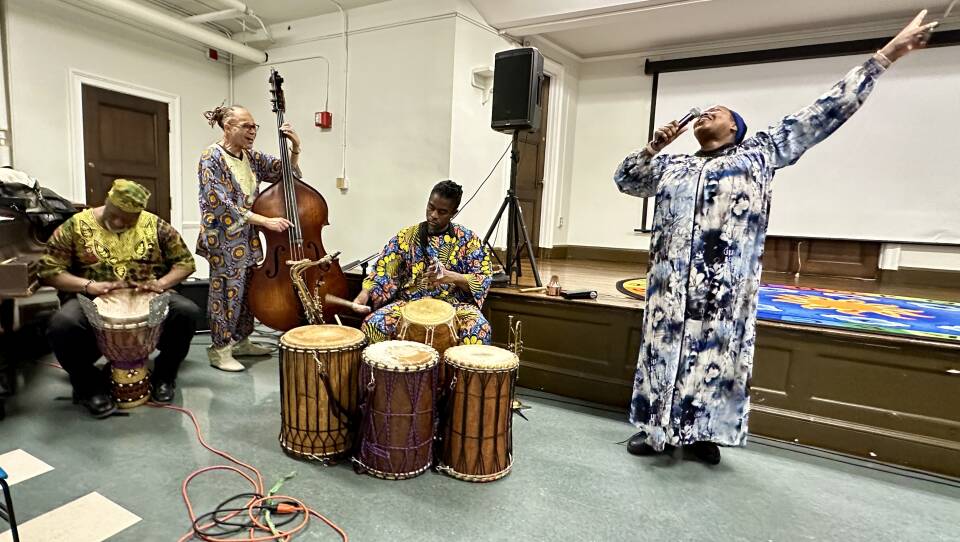Denise Washington threw open her hands and shouted “love, love, love!” to the audience gathered Wednesday afternoon at the Parker Hill Branch of the Boston Public Library.
The poet and Boston public school teacher recited her verse accompanied by the three musicians of her “Pop-Up Poetry” ensemble, and she urged the audience to join in joyous movement to the music. The event was part of the “Kwanzaa crawl,” a three-day celebration held at different branches of the Boston Public Library.
To those at the library and to those celebrating Kwanzaa at home or at community events, the holiday provides a guiding light long after the celebration ends. For some, this year's celebration also resonated with its message of shared humanity.
Kwanzaa is a weeklong observance of Black culture and the diverse African diaspora. But also at the heart of Kwanzaa is a focus on seven principles that, according to celebrants, should guide life. Each day a candle is lit to highlight those principles: unity, self-determination, collective work and responsibility, cooperative economics, purpose, creativity and faith.
“I don’t know that much about Kwanzaa myself so I thought that this would be a fun learning experience for all of us,” said Dan Perry, a classical vocalist from Somerville who came with his 9-year-old twin sons.

When Washington invited audience members to share poetry or a song, Perry stood up to sing the spiritual "Deep River." He said he was struck by the warmth of the event, coming at a moment in time when people need to see “the humanity of others.”
“More so than at any other time in my life, celebrations of unity are what we need now more than anything else,” Perry said, “and we need to see all of us as who we truly are and appreciate all the things that we all bring to the table and spend less time fighting, tearing each other down and hurting each other.”
Celebration of Kwanzaa first began in the late 1960s. Now, around Greater Boston, Kwanzaa is celebrated widely at community centers, YMCAs, schools, mosques and churches.
“There was no way I couldn't just be in love with Kwanzaa,” said Roxbury native Shaumba-Yandja Dibinga, founder and artistic director of OrigiNation Cultural Arts Center, based in Jamaica Plain.

Dibinga, 50, grew up in a household where Kwanzaa was always celebrated. Her late father, the Rev. Dr. Dibinga wa Said, was one of the original organizers of the annual Kwanzaa community events held in Boston, along with Sadiki Kambon, who is now director of the Black Community Information Center Inc., and chairman of the Nubian Square Coalition.
Dibinga now celebrates Kwanzaa with her extended family. She said the family's many grandchildren, some as young as 8 years old, lead the Kwanzaa ceremonies, including the passing of a ceremonial unity cup and a discussion of the day’s principle.
She hopes that all people — not just those who celebrate the holiday — pause to consider the principles of Kwanzaa and how they can incorporate them into their life.
It’s a powerful message in a divisive time.
“The universe is supposed to be, especially America, you know, a place where everyone's culture is important,” said Dibinga, “You can't just know about your culture. You have to know about the cultures of the people in the world, because that will help make you a better person and the community that you live in.”





